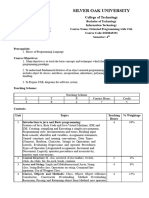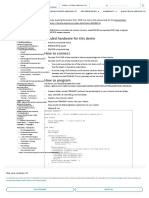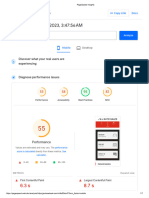Java Mastery
Uploaded by
Derek Dixman ChakowelaJava Mastery
Uploaded by
Derek Dixman ChakowelaTo become an expert in Java programming, we will follow a structured and empirically
proven teaching plan that emphasizes active learning, problem-solving, and practical
applications. This plan spans over 16 weeks, progressively building your knowledge while
integrating hands-on projects and real-world scenarios.
Stage 1: Foundations (Weeks 1-4)
Week 1: Introduction to Java and Environment Setup
Goal: Familiarize yourself with Java syntax and the development environment.
1. Install and configure the Java Development Kit (JDK) and an Integrated
Development Environment (IDE) like IntelliJ IDEA or Eclipse.
2. Basic structure of a Java program:
o main() method, System.out.println(), comments.
3. Data types and variables:
o Primitive types (int, char, float, etc.) and reference types.
Practice: Write 5 simple Java programs that display different messages using
System.out.println().
Week 2: Control Structures and Operators
Goal: Understand decision-making and looping in Java.
1. Operators: Arithmetic, relational, logical, and assignment.
2. Conditional statements: if, else if, else, switch.
3. Loops: for, while, do-while.
Practice: Write a program to find the factorial of a number using both iterative and
recursive methods.
Week 3: Methods and Scope
Goal: Learn about methods and variable scope.
1. Method declaration, definition, and calling.
2. Method parameters and return values.
3. Variable scope: Local vs. instance variables.
Practice: Create methods for calculating the area and perimeter of geometric shapes
and call them from the main() method.
Week 4: Arrays and Strings
Goal: Work with collections of data.
1. Arrays: Single-dimensional and multi-dimensional arrays.
2. String manipulation: String class methods (e.g., length(), substring(),
indexOf()).
3. StringBuilder and performance considerations.
Practice: Write programs to manipulate arrays and strings, such as reversing a string
or sorting an array.
Stage 2: Object-Oriented Programming (Weeks 5-8)
Week 5: Introduction to Object-Oriented Programming (OOP)
Goal: Understand the principles of OOP.
1. Classes and Objects: Defining and using classes.
2. Encapsulation: Access modifiers (public, private, protected).
3. Constructors and Destructors: Understanding constructor overloading.
Practice: Create a simple class, such as Book, with attributes and methods.
Week 6: Inheritance and Interfaces
Goal: Learn about inheritance and interfaces.
1. Inheritance: Base and derived classes, method overriding.
2. Abstract classes and methods.
3. Interfaces: Defining and implementing interfaces.
Practice: Implement a class hierarchy for Vehicle, Car, and Bike, and demonstrate
polymorphism through method overriding.
Week 7: Polymorphism and Exception Handling
Goal: Master the concepts of polymorphism and error handling.
1. Compile-time (static) polymorphism: Method overloading.
2. Run-time (dynamic) polymorphism: Virtual methods and interfaces.
3. Exception handling: try, catch, finally, and creating custom exceptions.
Practice: Write a program that uses exception handling to manage user input errors
gracefully.
Week 8: Advanced OOP Concepts
Goal: Deepen your understanding of OOP features in Java.
1. Nested classes and inner classes.
2. Static members: Static methods and variables.
3. Final classes and methods.
Practice: Create a project that utilizes nested classes and demonstrates static behavior
in Java.
Stage 3: Advanced Topics (Weeks 9-12)
Week 9: Collections Framework
Goal: Understand Java's collection classes.
1. List, Set, and Map interfaces: ArrayList, LinkedList, HashSet, TreeSet, HashMap,
TreeMap.
2. Iterators and enhanced for loop.
3. Common algorithms with collections: Sorting, searching.
Practice: Write programs that manipulate collections to store and retrieve user data
(e.g., a contact list).
Week 10: Java Streams and Lambda Expressions
Goal: Master functional programming features in Java.
1. Introduction to Java Streams: Creating and using streams.
2. Filtering, mapping, and reducing data.
3. Lambda expressions: Syntax and usage in functional interfaces.
Practice: Write a program that processes a list of integers, filtering even numbers and
calculating their sum using streams.
Week 11: File I/O and Serialization
Goal: Learn file operations and data persistence.
1. File handling: Reading from and writing to files using FileReader and FileWriter.
2. Serialization: Converting objects to byte streams and vice versa.
3. Handling exceptions in file operations.
Practice: Write a program that reads a list of objects from a file, processes them, and
writes results to another file.
Week 12: Multithreading and Concurrency
Goal: Understand multithreading and concurrent programming.
1. Creating and managing threads: Extending Thread and implementing Runnable.
2. Synchronization and thread safety.
3. Executor framework for thread management.
Practice: Implement a multi-threaded application that performs parallel computations
(e.g., a simple bank account simulation).
Stage 4: Expert-Level Projects and Problem Solving (Weeks 13-16)
Weeks 13-16: Capstone Projects
Goal: Apply your knowledge in real-world projects.
1. Choose and design larger projects such as:
o A text-based RPG game.
o A simple e-commerce application with user management.
o A task manager with GUI (using JavaFX or Swing).
2. Engage in competitive programming using platforms like LeetCode or HackerRank.
3. Participate in code reviews to improve coding standards and practices.
Final Task: Develop a comprehensive Java application that integrates all learned
concepts, focusing on efficient design, error handling, and user interaction.
Methods and Tools for Mastery:
• Active Learning: Write code every day to reinforce concepts.
• Peer Review: Collaborate with others for code reviews to enhance quality and
standards.
• Practice Platforms: Regularly solve problems on competitive coding sites to sharpen
problem-solving skills.
• Project-Based Learning: Apply theoretical knowledge to practical projects.
• Debugging and Profiling: Use tools like Eclipse's built-in debugger or VisualVM to
identify and fix issues in your code.
By following this structured teaching plan, you will develop a strong foundation in Java
programming, improve your coding skills, and progress toward becoming an expert in the
field.
You might also like
- Full Stack Development (Mern) : Submitted in Partial Fulfillment of The Requirements For The Award of The Degree ofNo ratings yetFull Stack Development (Mern) : Submitted in Partial Fulfillment of The Requirements For The Award of The Degree of27 pages
- Java Learning Roadmap For Beginners - KabiroskyNo ratings yetJava Learning Roadmap For Beginners - Kabirosky6 pages
- Java Programming (Level-6) Lab Lesson PlanNo ratings yetJava Programming (Level-6) Lab Lesson Plan3 pages
- Silver Oak University: College of TechnologyNo ratings yetSilver Oak University: College of Technology5 pages
- PC 101 - INFT - Program Core - Object Oriented Programming Methodology (OOPM) - Java Programing - FE - SEM 2No ratings yetPC 101 - INFT - Program Core - Object Oriented Programming Methodology (OOPM) - Java Programing - FE - SEM 26 pages
- 92 Corrected and Approved by B.T.E. On Dated 19.04.2017No ratings yet92 Corrected and Approved by B.T.E. On Dated 19.04.20172 pages
- Object_Oriented_Programming_through_Java_Digital_Notes_Maruthi_PNo ratings yetObject_Oriented_Programming_through_Java_Digital_Notes_Maruthi_P136 pages
- Croma Campus - Core Java Training CurriculumNo ratings yetCroma Campus - Core Java Training Curriculum8 pages
- Object Oriented Programming Concepts Using JavaNo ratings yetObject Oriented Programming Concepts Using Java2 pages
- OOP in Java BCA Syllabus IT College NepalNo ratings yetOOP in Java BCA Syllabus IT College Nepal4 pages
- The Java Workshop: Learn object-oriented programming and kickstart your career in software developmentFrom EverandThe Java Workshop: Learn object-oriented programming and kickstart your career in software developmentNo ratings yet
- JAVA for Beginner's Crash Course: Java for Beginners Guide to Program Java, jQuery, & Java ProgrammingFrom EverandJAVA for Beginner's Crash Course: Java for Beginners Guide to Program Java, jQuery, & Java Programming4/5 (1)
- Sorting Algorithms in Computer Science With C Code Snippets For EachNo ratings yetSorting Algorithms in Computer Science With C Code Snippets For Each5 pages
- BIT150 Assignment 1 - From Introduction To C++ FunctionsNo ratings yetBIT150 Assignment 1 - From Introduction To C++ Functions13 pages
- Pressstatement Measures in Response To Deteriorating Macroecomic EnvironmentNo ratings yetPressstatement Measures in Response To Deteriorating Macroecomic Environment3 pages
- ECE 301 - Digital Electronics: Sequential Logic Circuits: FSM DesignNo ratings yetECE 301 - Digital Electronics: Sequential Logic Circuits: FSM Design27 pages
- Arduino Playground - RDM630RFIDReaderLibraryNo ratings yetArduino Playground - RDM630RFIDReaderLibrary2 pages
- iSMA-Configurator - Datasheet - V1.0 ControladorNo ratings yetiSMA-Configurator - Datasheet - V1.0 Controlador2 pages
- Driver Installation Guide For MAC10.15 OS (Stick) - 2.0No ratings yetDriver Installation Guide For MAC10.15 OS (Stick) - 2.010 pages
- Practical File CS 2023-24 - KV RAJAHMUNDRYNo ratings yetPractical File CS 2023-24 - KV RAJAHMUNDRY55 pages
- Phycore - Stm32Mp1: Ramp Up Your M4 Application With A7 Linux PowerNo ratings yetPhycore - Stm32Mp1: Ramp Up Your M4 Application With A7 Linux Power2 pages
- Where Can Buy (Ebook PDF) Computing For Business Success (Pearson Original Ebook) (4e) Ebook With Cheap Price100% (3)Where Can Buy (Ebook PDF) Computing For Business Success (Pearson Original Ebook) (4e) Ebook With Cheap Price49 pages
- Building An Elastic Query Engine On Disaggregated StorageNo ratings yetBuilding An Elastic Query Engine On Disaggregated Storage15 pages
- CS217 - Object-Oriented Programming (OOP) Assignment # 1: Carefully Read The Following Instructions!No ratings yetCS217 - Object-Oriented Programming (OOP) Assignment # 1: Carefully Read The Following Instructions!2 pages
- Oracle 11g Business Intelligence Enterprise Edition (OBIEE)No ratings yetOracle 11g Business Intelligence Enterprise Edition (OBIEE)6 pages
- Computer Vision Ii: Ai Courses by OpencvNo ratings yetComputer Vision Ii: Ai Courses by Opencv8 pages
- Full Stack Development (Mern) : Submitted in Partial Fulfillment of The Requirements For The Award of The Degree ofFull Stack Development (Mern) : Submitted in Partial Fulfillment of The Requirements For The Award of The Degree of
- PC 101 - INFT - Program Core - Object Oriented Programming Methodology (OOPM) - Java Programing - FE - SEM 2PC 101 - INFT - Program Core - Object Oriented Programming Methodology (OOPM) - Java Programing - FE - SEM 2
- 92 Corrected and Approved by B.T.E. On Dated 19.04.201792 Corrected and Approved by B.T.E. On Dated 19.04.2017
- Object_Oriented_Programming_through_Java_Digital_Notes_Maruthi_PObject_Oriented_Programming_through_Java_Digital_Notes_Maruthi_P
- The Java Workshop: Learn object-oriented programming and kickstart your career in software developmentFrom EverandThe Java Workshop: Learn object-oriented programming and kickstart your career in software development
- JAVA for Beginner's Crash Course: Java for Beginners Guide to Program Java, jQuery, & Java ProgrammingFrom EverandJAVA for Beginner's Crash Course: Java for Beginners Guide to Program Java, jQuery, & Java Programming
- Sorting Algorithms in Computer Science With C Code Snippets For EachSorting Algorithms in Computer Science With C Code Snippets For Each
- BIT150 Assignment 1 - From Introduction To C++ FunctionsBIT150 Assignment 1 - From Introduction To C++ Functions
- Pressstatement Measures in Response To Deteriorating Macroecomic EnvironmentPressstatement Measures in Response To Deteriorating Macroecomic Environment
- ECE 301 - Digital Electronics: Sequential Logic Circuits: FSM DesignECE 301 - Digital Electronics: Sequential Logic Circuits: FSM Design
- Driver Installation Guide For MAC10.15 OS (Stick) - 2.0Driver Installation Guide For MAC10.15 OS (Stick) - 2.0
- Phycore - Stm32Mp1: Ramp Up Your M4 Application With A7 Linux PowerPhycore - Stm32Mp1: Ramp Up Your M4 Application With A7 Linux Power
- Where Can Buy (Ebook PDF) Computing For Business Success (Pearson Original Ebook) (4e) Ebook With Cheap PriceWhere Can Buy (Ebook PDF) Computing For Business Success (Pearson Original Ebook) (4e) Ebook With Cheap Price
- Building An Elastic Query Engine On Disaggregated StorageBuilding An Elastic Query Engine On Disaggregated Storage
- CS217 - Object-Oriented Programming (OOP) Assignment # 1: Carefully Read The Following Instructions!CS217 - Object-Oriented Programming (OOP) Assignment # 1: Carefully Read The Following Instructions!
- Oracle 11g Business Intelligence Enterprise Edition (OBIEE)Oracle 11g Business Intelligence Enterprise Edition (OBIEE)






































































































